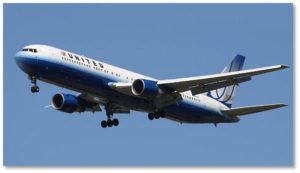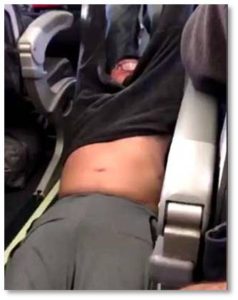By now you have probably seen or at least heard about a United Airlines passenger being literally dragged off an overbooked airplane. after a computer algorithm selected him at random.
The passenger refused to cooperate—he could have walked off the plane with some dignity. Instead he chose to make a statement by forcing the Chicago Aviation Police to manhandle him. You know, like Civil Rights protesters in the South.
Videos of the incident have gone viral and it now become A Thing.
This story gives us several points to ponder.
Point #1: The Offer
It seems that no one on the plane took UA’s offer of money to give their seat up to—wait for it—four United Airlines employees. Not paying customers. Not a bereaved family trying to get home. Not a medical emergency. Not even a politician or a celebrity. They chose to treat a customer badly in order to smooth things for four of their own.
To be fair, this was a flight crew that needed to get back to base to keep another flight on schedule. In any other circumstance, bumping customers for deadheading crew would be appalling.
This is, however, the logical extension of the airline companies’ growth plans, which have systematically and consistently put customer satisfaction at the bottom of their priority list. Once you have gotten away with treating your customers badly, once you have made maximizing profit at customer expense a policy, once you have inured yourself to the complaints and outrage of those who fill your narrow, flat, upright, hard and uncomfortable seats, well, you can do anything at all.
Dragging a customer down the aisle hardly seems like much of a leap.
Point #2: The Options
 After getting no takers on their $400 offer for anyone who would give up a seat, they increased it to $800. Still no volunteers. At this point, United Airlines had other options. (I am assuming there were no empty seats in First Class,)
After getting no takers on their $400 offer for anyone who would give up a seat, they increased it to $800. Still no volunteers. At this point, United Airlines had other options. (I am assuming there were no empty seats in First Class,)
They could have:
- Increased the amount of the offer
- Offered First Class upgrades for a future United Airlines flight.
- Offered a “couples rate” to get two volunteers.
- Offered a free ticket to anywhere in the continental United States.
- Offered a year’s membership in the United Club airport lounges.
- Offered a package of two or three of these options.
There, was that so difficult? It took me five minutes to think of six things that would have made a customer or two happier about giving up their seat(s).
Point #3: The Algorithm
Having made the decision to throw a passenger from the plane, UA whiffed on making a logical selection about which human beings to target and had a computer decide.
Welcome to our Brave New World in which algorithms decide and human beings follow orders.
As Alistair Croll points out in his blog post, “I just did what the computer told me to,” this incident demonstrates what happens when machines make black-and-white decisions inside the gray areas that humans currently finesse.
These small infractions of the rules—looking the other way or allowing a small change—make life easier for us all and they depend on the kindness of strangers. Such generosity also avoids creating public relations debacles like this one.
Binary Decisions
But computers don’t operate in gray areas. They are binary: on or off, light or dark, yes or no, go or stay. Given instructions that someone had to go the computer algorithm selected four.
Three of the four got up and left. Number Four—a doctor—refused to move because he had patients to see. He would not cooperate. Well, why should he? He had a ticket. He had a seat. And he had a schedule.
 Enter Chicago’s Aviation Police with instructions to deal with this non-violent, passively resisting human being. Asked to leave, the doctor still would not collaborate in his randomly selected humiliation, inconvenience, and schedule-breaking ouster. The Chicago Aviation Police is a hammer and they were looking for a nail.
Enter Chicago’s Aviation Police with instructions to deal with this non-violent, passively resisting human being. Asked to leave, the doctor still would not collaborate in his randomly selected humiliation, inconvenience, and schedule-breaking ouster. The Chicago Aviation Police is a hammer and they were looking for a nail.
When they hauled the man out of his seat he struck his face on the armrest and began to bleed. This constitutes assault. They then dragged him down the aisle with his shirt rolling up and his glasses falling off.
I Did What I Was Told
We have gone from the infamous excuse, “I was just following orders,” to the new justification, “I just did what the computer told me to.” How quickly and easily we human beings stoop to inhuman behavior.
The officer could have told the airline that the overbooking was their fault and, thus, their issue to deal with but he would not drag a decent, passively resisting human being down the aisle. He could have but he didn’t. Given a chance to exert force over another human being, he took it.
A human being tasked with taking four people off the plane might have noted that the passenger was a doctor and passed him by in favor of someone with fewer life-and-death responsibilities. A computer algorithm is blind to such nuance.
No Apology
United Airlines has apologized for the overbooking situation and for having to re-accommodate customers. But not for treating a human being, and a customer badly enough to make him bleed.
To complicate an already outrageous situation, the doctor is Chinese, the videos of his mistreatment have gone viral in China and discrimination is being alleged. The Unite Airlines PR department is undoubtedly working around the clock but they are bailing against the tide.
This incident demonstrates so many failures of good judgment and so many bad decisions that it’s difficult to even list them. It does not, however, augur well for a future in which computer algorithms and programmed robots take over human functions. We have now seen the future in which humans execute the decisions of mechanical devices and that future is us.


You are right about that Aline – that’s why I said ‘in any other industry’. In the airline industry its part of the fine print when you buy the ticket and that is true of all carriers. Passengers can’t be outraged as they agree to those terms when they purchase the ticket. In 30 years and millions of flying miles I have never seen this. Personally speaking (I fear TSA) if they asked me to get off a plane, I would get off the plane, even with a ticket, a boarding pass and a seat.
The outrage we are feeling is the methodology and PR nightmare created by United’s CEO and TSA. Four failed attempts at apologizing, the unnecessary use of violence gone viral and millions commenting on social media. Can it get any worse?
Sean Spicer says, “hold my beer and watch this…”
I would probably get off the plane too, Suze, but not quietly. I would be shouting, “Video this, folks. They’re throwing Grandma from the plane and I’ll miss my ride home.”
In any other business willfully selling something you don’t have and can’t deliver is called fraud.
They get away with it because they are not selling you the actual seat, as with a theater or sporting event. They are selling you a contract that says they will move you from Point A to Point B. How and when you get there is up to them, not you. https://www.wsj.com/articles/what-to-do-when-youre-on-an-overbooked-flight-1491930615?emailToken=JRrydf55Y32WgdY1bcwj1FQ0K7UPTuOOA0zXIXaPK0/RrnGQpuTkzqNwgMW6u2moQkV365UK628wRSGU2TY7BZ7Kw%2BAmzA%3D%3D
United’s CEO is just another old white man that failed to understand the power and global reach of social media. He has a PR nightmare on his hands and suddenly finds you can’t walk back when live video tells the story for you.
I fully agree. And the PR Nightmare is of his own doing from what I’ve seen thus far!
Well, I agree what they did was wrong. One of the police officers was suspended from what I’ve read today. And I think you “may” be wrong about “UA whiffed on making a logical selection” Now I’ve heard that they “randomly selected” four people, which may be true and in that case you’re assessment would be correct. But I’ve also read that they followed a script to find customers that would be least affected in terms of catching other flights, have family members with them or not, are disabled and other such factors. If this turns out to be the actual case, then you’re assessment wouldn’t be quite correct. They’re also supposed to put the highest award members in First Class if anything is open so that the crew could fill those now available seats – I’ve seen that happen. Finally, I CAN tell you that their First Class seats have improved quite a bit on their 757’s – kind of like little “pods” that can lie flat now – I got to try them out on an upgraded flight with United just last Saturday.
Yes, I heard about the qualifications they program the computer to sort by so you can stick pins in that one — which I know you love to do. I did fly FC on United from SF to Boston two years ago — because I did not stay quiet and obedient — and it was a pleasant experience.
There is absolutely nothing right about United’s behavior. Shameful and unnecessary force is never the answer to any situation. I was on an overbooked Delta flight last year and they offered many of the concessions you referenced, including $1200 per person. They needed 12 people to step off and it became a bidding war that was fun and funny. If I had not been traveling to an event I would have leapt out of my seat!
Agreed. It’s really interesting to me how this whole “Overbooking” phenomenon is also pretty much the airlines own doing as well, since they want the planes packed with folks all the time, to the point that they’ve actually determined it’s good business practice to reduce the number of flights and “play the odds” of having to pay bumped passengers.
The airlines are gambling that enough people won’t show up to cover the overbooking. As they said on NPR last night, imagine this policy applying to other industries: you sit down to dinner and get ready to order your meal when the maitre d’ tells you that you have to leave because someone else needs the table; you open the program to read about the Broadway play when an usher asks you to give up your seat to someone else who also bought a ticket; you start your car to pull onto the ferry when an employee tells you to pull over to the side because one of their employees needs the space. It sounds absurd outside of the airline industry but, as I have said before, they have turned mistreating their customers into business as usual.